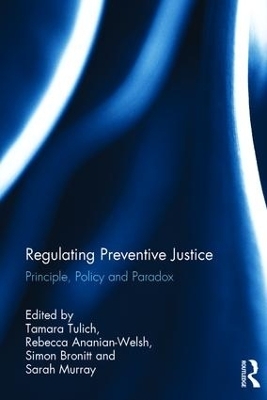
Regulating Preventive Justice
Routledge (Verlag)
978-1-138-65818-9 (ISBN)
Like medicine, law is replete with axioms of prevention. ‘Prevention is better than cure’ has a long pedigree in both fields. 17th century jurist Sir Edward Coke observed that ‘preventing justice excelleth punishing justice’. A century later, Sir William Blackstone similarly stated that ‘preventive justice is ...preferable in all respects to punishing justice’. This book evaluates the feasibility and legitimacy of state attempts to regulate prevention. Though prevention may be desirable as a matter of policy, questions are inevitably raised as to its limits and legitimacy, specifically, how society reconciles the desirability of averting risks of future harm with respect for the rule of law, procedural fairness and human rights.
While these are not new questions for legal scholars, they have been brought into sharper relief in policy and academic circles in the wake of the September 11 terrorist attacks. Over the past 15 years, a body of legal scholarship has tracked the intensified preventive focus of anti-terrorism law and policy, observing how this focus has impacted negatively upon traditional legal frameworks. However, preventive law and policy in other contexts, such as environmental protection, mental health, immigration and corruption has not received sustained focus. This book extends that body of scholarship, through use of case studies from these diverse regulatory settings, in order to examine and critique the principles, policies and paradoxes of preventive justice.
"Whereas earlier scholars looked upon preventive justice as a source and means of regulation, the powerfully argued contributions to this volume provide forceful reasons to consider whether we would do better talk about regulating preventive justice."
Professor Lucia Zedner, Oxford University
Tamara Tulich is a Lecturer at the University Of Western Australia. Rebecca Ananian-Welsh is a Lecturer at the TC Beirne School of Law, University of Queensland, Australia. Simon Bronitt is a Professor at the TC Beirne School of Law, University of Queensland, Australia. Sarah Murray is a Senior Lecturer at the University Of Western Australia.
1. Introduction, Rebecca Ananian-Welsh, Simon Bronitt, Sarah Murray and Tamara Tulich Part 1: The preventive justice concept 2. Critical Reflections on Preventive justice: theory and history, Tamara Tulich 3. Prevention, Precaution and Adaptive Management: An Environmental Law Perspective on Preventative Justice , Jocelyn Stacey Part 2: Preventive justice: legal spaces, techniques and technologies 4. Preventive Justice, Risk of Harm and Mental Health Laws, Bernadette McSherry 5. Policing Persons with Mental Illness: Preventive Justice or Preventing Injustice?, Helen Punter 6. Recent Amendments to the Australian Control Order Scheme, Susan Donkin 7. ‘If at first you don’t succeed…’: The Escalation of Preventive Organised Crime Measures, Rebecca Ananian-Welsh 8. ‘Preventive Justice’ in the Context of the Legal and Policy Discussion Surrounding Illicit Drugs: A Comparative Perspective, Christopher Michaelson and Sam Hartridge 9. Preventive Justice and Immigration Law and Policy: the detention of non-citizens in the United Kingdom and Australia, Peter Billings Part 3: Evaluating preventive justice: measuring costs and benefits, payoffs and pitfalls 10. New Anti-Corruption Strategies: Counting the Costs and Benefits of Deferred Prosecution, Simon Bronitt 11. Preventive Justice, the Courts and the Pursuit of Legitimacy, Sarah Murray 12. The Effectiveness of Anti-Terror PDOs, George Williams and Svetlana Tyulkina 13. Preventive Justice Principles for Soft Responses to Terrorism, Keiran Hardy 14. An Evaluation of Preventative Measures and Counter-Terrorism Laws, Tim Legrand and Teneille Elliott 15. Conclusion
| Erscheinungsdatum | 24.05.2016 |
|---|---|
| Verlagsort | London |
| Sprache | englisch |
| Maße | 156 x 234 mm |
| Gewicht | 476 g |
| Themenwelt | Recht / Steuern ► EU / Internationales Recht |
| Recht / Steuern ► Strafrecht ► Kriminologie | |
| ISBN-10 | 1-138-65818-9 / 1138658189 |
| ISBN-13 | 978-1-138-65818-9 / 9781138658189 |
| Zustand | Neuware |
| Haben Sie eine Frage zum Produkt? |
aus dem Bereich


